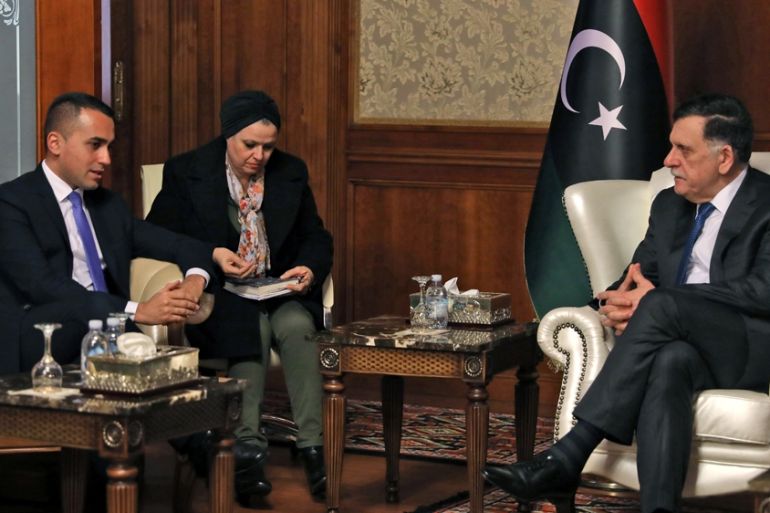Italy’s Di Maio holds talks with Libya’s rival leaders
GNA says Italian foreign minister renewed support for Tripoli-based gov’t, while no details emerge from Haftar meeting.

Italian Foreign Minister Luigi Di Maio has reiterated his country’s backing for Libya‘s United Nations-recognised government during a visit to the capital, according to the Tripoli-based administration.
In a statement on Tuesday, the Government of National Accord (GNA) said Di Maio had met its head, Fayez al-Sarraj, and renewed “Italy‘s support” for it, as well as for the efforts of UN Libya envoy Ghassan Salame to revive the political process in the country.
Keep reading
list of 3 itemsMultiple foreign armed groups involved in Libya conflict: UN
Italy’s dubious policies in Libya
Libya has been riven by turmoil and division since a NATO-backed uprising that toppled and killed longtime ruler Muammar Gaddafi in 2011.
It has since been split between rival administrations in the country’s east and the west vying for power.
The Italian official expressed hope that an international conference on Libya set to be held in Berlin in January, according to the UN, could lead to a “consensus” between countries involved in the Libyan crisis, the statement added.
The Berlin conference was called with an aim of ending international divisions over Libya and paving the way for a political solution to the conflict.
Separately on Tuesday, Di Maio met al-Sarraj’s rival, renegade General Khalifa Haftar at the headquarters of the self-styled Libyan National Army in al-Rajma, east of Benghazi.
The pro-Haftar al-Marsad news website posted a video of the meeting, but did not provide details.
Tripoli offensive
Haftar’s forces in April launched a military campaign to capture Tripoli from the GNA but have so far failed to progress beyond the city’s outskirts.
The offensive has sparked fighting that has left more than 1,000 people dead and 140,000 displaced, according to the UN.
On Thursday, Haftar announced that he had ordered his fighters to launch a “decisive battle” to capture the capital.
On Monday, forces in five cities in western Libya fighting under the GNA announced a mobilisation to defend Tripoli against Haftar’s latest push.
In a statement, authorities in the cities of Kabaw, Zliten, Khoms, Msallata and Zawiya called for coordination and cooperation to repel any attacks.
“On the ground, there hasn’t been any major change [since Haftar’s announcement]; any advancement for neither side of the war or factions on the ground,” Al Jazeera’s Mahmoud Abdelwahed, reporting from Tripoli, said.
“Haftar’s forces have been waging a media war to intimidate and test their enemies. The latest declaration was on Thursday by Haftar himself, declaring the ‘Zero Hour’, encouraging his forces to enter Tripoli.
“So, this declaration by those cities for mass mobilisation is a kind of counter declaration to intimidate Haftar’s forces who are now trying to push closer to the city centre.”
Meanwhile, the Kremlin said on Tuesday that Russia’s President Vladimir Putin and his Turkish counterpart, Recep Tayyip Erdogan, will discuss Ankara’s offer to provide military support to the GNA during talks in Turkey next month.
On Saturday, Turkey sent a bilateral accord with the Tripoli government to its parliament for approval, in a move that brings it closer to potentially sending military aid to the Tripoli-based government.
Ankara has said that it may send military support to Libya if al-Serraj’s government requested it, but Turkish Foreign Minister Mevlut Cavusoglu said on Saturday that no such request had been made to Turkey yet.